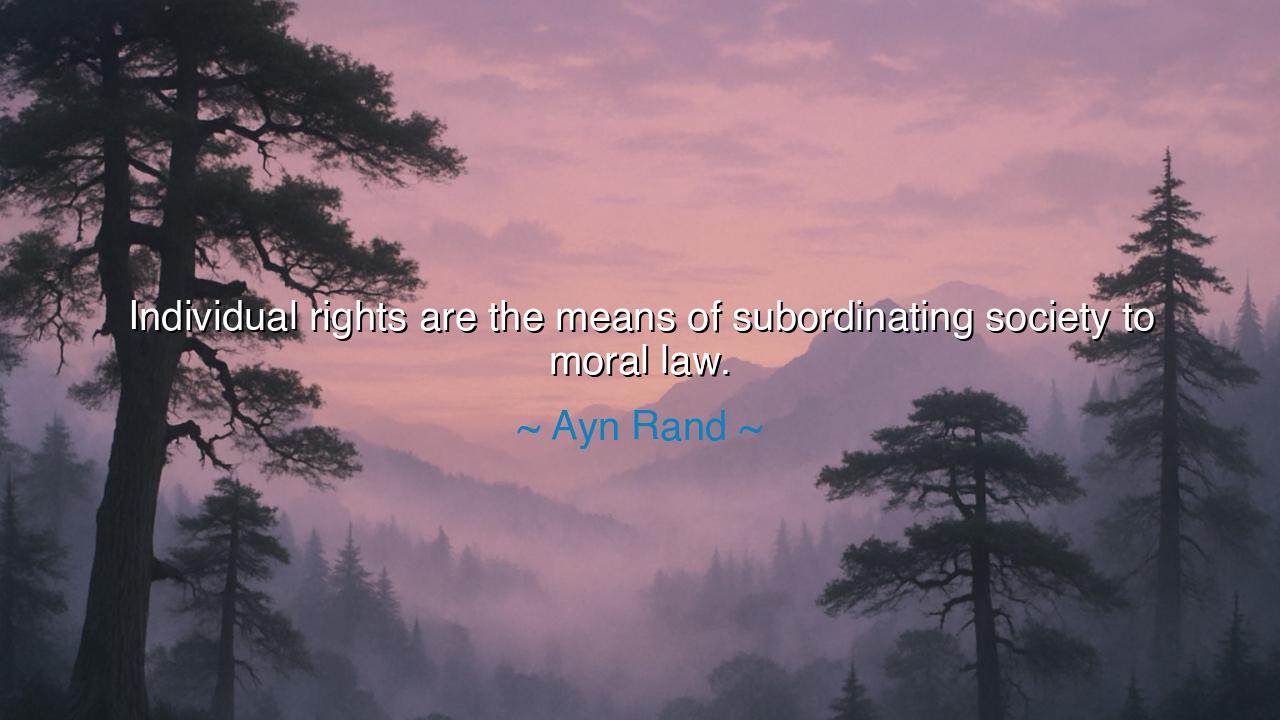
Individual rights are the means of subordinating society to moral






"Individual rights are the means of subordinating society to moral law." These powerful words, spoken by Ayn Rand, carry with them a truth that resonates through the corridors of history and human experience. In a world where society is often seen as the ultimate authority, where collective interests may sometimes overshadow the individual, Rand’s assertion challenges us to rethink the balance between the rights of the individual and the needs of society. According to Rand, individual rights are not mere privileges—they are the very foundation upon which a just and moral society must be built. These rights are the means through which moral law is upheld, and through which freedom, justice, and honor are protected for every human being.
In the ancient world, the concept of the individual was a subject of great importance and debate. Socrates, that great philosopher of Athens, sought to elevate the individual soul above the masses, to call each person to self-examination and to live a life grounded in virtue. He believed that each human being had an inner moral compass, which, if followed, could lead to a just society. Socrates was tried and executed for corrupting the youth of Athens, but in his final moments, he did not bow to the collective forces that demanded his conformity. Instead, he held fast to his individual rights to think, to question, and to live in accordance with his own moral principles, even at the cost of his life. Through his sacrifice, Socrates embodied the idea that the individual, when grounded in moral law, can stand apart from the pressures of society, and in doing so, can contribute to a more just world.
The Romans, too, had a complex relationship with the idea of the individual. On one hand, the Roman ideal of the civic duty required individuals to subordinate their personal desires for the good of the state. Yet, Roman philosophers like Cicero championed the concept of natural rights, which were seen as intrinsic to the human condition. Cicero believed that the individual, governed by reason, had the right to live according to the moral law that transcends the whims of any government or ruler. Even in the face of tyranny, the individual had a responsibility to uphold justice and to refuse to bow to corrupt authority. Thus, the rights of the individual were not merely societal constructs but were seen as part of a higher, divine moral law.
Rand’s idea that individual rights are the means through which society is subordinated to moral law speaks to a deeper truth: morality is not something that should be imposed from above, but something that must be protected within each individual. When a society suppresses the rights of the individual, it undermines the very moral foundation upon which justice rests. Take, for instance, the story of Nelson Mandela, who, in his struggle against the apartheid system of South Africa, embodied the very essence of individual rights. Despite the overwhelming power of the state, Mandela stood firm in his belief that freedom, justice, and equality were moral imperatives that transcended any law that unjustly suppressed them. His courage to uphold his individual rights, to question the moral law of his society, led to a revolution not only in South Africa but in the hearts of all those who believe in the inherent dignity of every human being.
In the case of Martin Luther King Jr., too, we see how individual rights serve as a means to subject society to moral law. His famous “I Have a Dream” speech speaks not only of the dreams of freedom for African Americans but of a world where the moral rights of every individual are respected and protected. King’s refusal to conform to the racist laws of the American South was an act of profound individual courage. He did not simply accept the oppressive norms of his time; instead, he elevated the individual right to justice, to equality, to dignity above the laws that sought to dehumanize people based on their race. In this way, King’s actions illustrated the very essence of Rand’s philosophy: that it is the individual’s right to live according to moral law that has the power to transform society, to bring it into alignment with the highest ideals of justice and truth.
The lesson of Rand's words and the historical examples we have examined is one of profound significance for us all: individual rights are not mere political tools but moral imperatives that safeguard the soul of society. When we elevate the rights of the individual, we honor the moral law that binds us to a higher purpose, a purpose beyond the collective whims of the moment. Morality cannot be imposed by force; it must be embraced and protected by the individual, for only in this way can it shape society in ways that are just and true. To suppress the individual is to allow the moral law to be forgotten, and thus to invite the decay of the very society that claims to value justice and freedom.
In our own lives, let us remember that the defense of individual rights is not just about self-interest but about the moral duty we have to uphold the dignity of all. Speak out when you see injustice, question the norms that seek to suppress freedom, and stand firm in your commitment to a higher moral law that honors the inherent worth of every human being. The individual is not meant to be subjugated to the will of society but to act as the very foundation upon which a just society is built. In doing so, we not only protect our own rights, but we protect the soul of the society we share.






AAdministratorAdministrator
Welcome, honored guests. Please leave a comment, we will respond soon